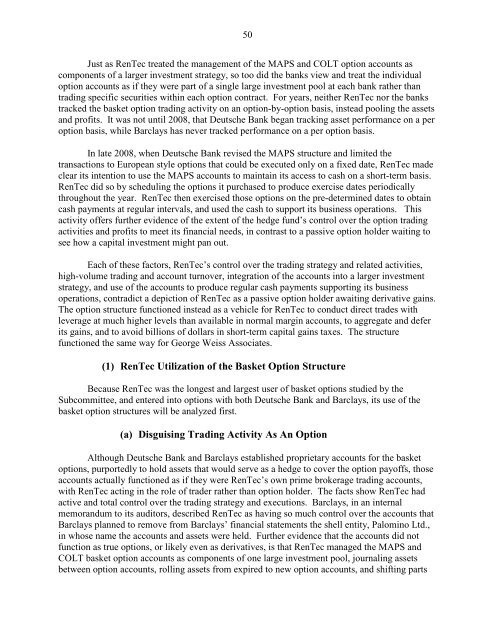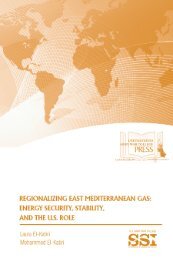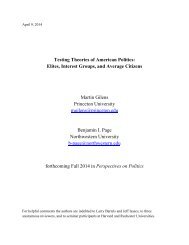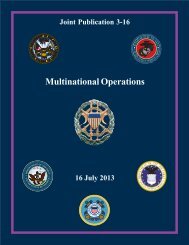ABUSE OF STRUCTURED FINANCIAL PRODUCTS- Misusing Basket Options to Avoid Taxes and Leverage Limits MAJORITY AND MINORITY STAFF REPORT
ABUSE OF STRUCTURED FINANCIAL PRODUCTS- Misusing Basket Options to Avoid Taxes and Leverage Limits MAJORITY AND MINORITY STAFF REPORT
ABUSE OF STRUCTURED FINANCIAL PRODUCTS- Misusing Basket Options to Avoid Taxes and Leverage Limits MAJORITY AND MINORITY STAFF REPORT
Create successful ePaper yourself
Turn your PDF publications into a flip-book with our unique Google optimized e-Paper software.
50<br />
Just as RenTec treated the management of the MAPS <strong>and</strong> COLT option accounts as<br />
components of a larger investment strategy, so <strong>to</strong>o did the banks view <strong>and</strong> treat the individual<br />
option accounts as if they were part of a single large investment pool at each bank rather than<br />
trading specific securities within each option contract. For years, neither RenTec nor the banks<br />
tracked the basket option trading activity on an option-by-option basis, instead pooling the assets<br />
<strong>and</strong> profits. It was not until 2008, that Deutsche Bank began tracking asset performance on a per<br />
option basis, while Barclays has never tracked performance on a per option basis.<br />
In late 2008, when Deutsche Bank revised the MAPS structure <strong>and</strong> limited the<br />
transactions <strong>to</strong> European style options that could be executed only on a fixed date, RenTec made<br />
clear its intention <strong>to</strong> use the MAPS accounts <strong>to</strong> maintain its access <strong>to</strong> cash on a short-term basis.<br />
RenTec did so by scheduling the options it purchased <strong>to</strong> produce exercise dates periodically<br />
throughout the year. RenTec then exercised those options on the pre-determined dates <strong>to</strong> obtain<br />
cash payments at regular intervals, <strong>and</strong> used the cash <strong>to</strong> support its business operations. This<br />
activity offers further evidence of the extent of the hedge fund’s control over the option trading<br />
activities <strong>and</strong> profits <strong>to</strong> meet its financial needs, in contrast <strong>to</strong> a passive option holder waiting <strong>to</strong><br />
see how a capital investment might pan out.<br />
Each of these fac<strong>to</strong>rs, RenTec’s control over the trading strategy <strong>and</strong> related activities,<br />
high-volume trading <strong>and</strong> account turnover, integration of the accounts in<strong>to</strong> a larger investment<br />
strategy, <strong>and</strong> use of the accounts <strong>to</strong> produce regular cash payments supporting its business<br />
operations, contradict a depiction of RenTec as a passive option holder awaiting derivative gains.<br />
The option structure functioned instead as a vehicle for RenTec <strong>to</strong> conduct direct trades with<br />
leverage at much higher levels than available in normal margin accounts, <strong>to</strong> aggregate <strong>and</strong> defer<br />
its gains, <strong>and</strong> <strong>to</strong> avoid billions of dollars in short-term capital gains taxes. The structure<br />
functioned the same way for George Weiss Associates.<br />
(1) RenTec Utilization of the <strong>Basket</strong> Option Structure<br />
Because RenTec was the longest <strong>and</strong> largest user of basket options studied by the<br />
Subcommittee, <strong>and</strong> entered in<strong>to</strong> options with both Deutsche Bank <strong>and</strong> Barclays, its use of the<br />
basket option structures will be analyzed first.<br />
(a) Disguising Trading Activity As An Option<br />
Although Deutsche Bank <strong>and</strong> Barclays established proprietary accounts for the basket<br />
options, purportedly <strong>to</strong> hold assets that would serve as a hedge <strong>to</strong> cover the option payoffs, those<br />
accounts actually functioned as if they were RenTec’s own prime brokerage trading accounts,<br />
with RenTec acting in the role of trader rather than option holder. The facts show RenTec had<br />
active <strong>and</strong> <strong>to</strong>tal control over the trading strategy <strong>and</strong> executions. Barclays, in an internal<br />
memor<strong>and</strong>um <strong>to</strong> its audi<strong>to</strong>rs, described RenTec as having so much control over the accounts that<br />
Barclays planned <strong>to</strong> remove from Barclays’ financial statements the shell entity, Palomino Ltd.,<br />
in whose name the accounts <strong>and</strong> assets were held. Further evidence that the accounts did not<br />
function as true options, or likely even as derivatives, is that RenTec managed the MAPS <strong>and</strong><br />
COLT basket option accounts as components of one large investment pool, journaling assets<br />
between option accounts, rolling assets from expired <strong>to</strong> new option accounts, <strong>and</strong> shifting parts







